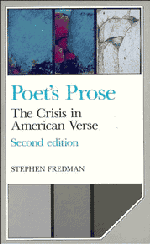Book contents
- Frontmatter
- Contents
- Preface to the second edition
- Preface to the first edition
- List of abbreviations
- Introduction: Prose and the American crisis of verse
- 1 The generative sentence: William Carlos Williams's Kora in Hell: Improvisations
- 2 “A life tracking itself”: Robert Creeley's Presences: A Test for Marisol
- 3 “He chose to include”: John Ashbery's Three Poems
- 4 The crisis at present: talk poems and the new poet's prose
- Notes
- Index
- Cambridge Studies in American Literature and Culture
Preface to the second edition
Published online by Cambridge University Press: 04 April 2011
- Frontmatter
- Contents
- Preface to the second edition
- Preface to the first edition
- List of abbreviations
- Introduction: Prose and the American crisis of verse
- 1 The generative sentence: William Carlos Williams's Kora in Hell: Improvisations
- 2 “A life tracking itself”: Robert Creeley's Presences: A Test for Marisol
- 3 “He chose to include”: John Ashbery's Three Poems
- 4 The crisis at present: talk poems and the new poet's prose
- Notes
- Index
- Cambridge Studies in American Literature and Culture
Summary
The issues explored in this book first arose for me in the context of the poetry scene in San Francisco in the seventies. As I thought about a second edition, I felt it was important to make this context more explicit by giving a glimpse of the dynamic poetry scene in which I found posed in compelling ways questions that guided the inquiry in this book: questions about modern poetry, about American poetry, and about the place of prose within poetry. My investigation of these issues has, I now recognize, a necessarily circular quality: The contemporary poetry scene posed its questions; I conducted an inquiry into a number of modern, postmodern, and even transcendentalist poets who have conceived of prose as central to their writing of poetry; this inquiry led me to return to the contemporary scene with a clearer appreciation of its aims, antecedents, crises, and accomplishments. What follows in this preface is a brief attempt at historical placement, presenting the inception of this book mostly through the words of poets participating in an informal, cranky, but nonetheless highly provocative debate. Through reading the heated and sometimes partially obscure conversation held among the members of this poetic community, we can sense the urgency and glimpse the issues at stake for the poets who were actively engaged in writing the new poet's prose.
- Type
- Chapter
- Information
- Poet's ProseThe Crisis in American Verse, pp. vii - xiiPublisher: Cambridge University PressPrint publication year: 1990



